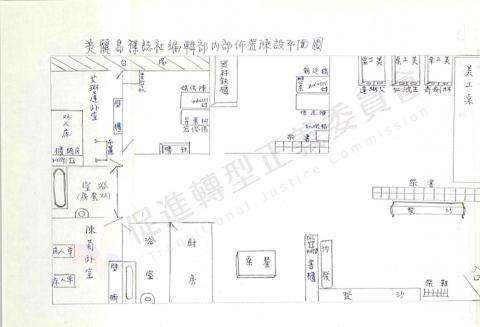Recently declassified National Security Bureau files showed that the former Chinese Nationalist Party (KMT) regime was keeping close tabs on Formosa Magazine and learned the entire content of its first issue before it went to print.
Formosa Magazine was at the center of 1979’s Kaohsiung Incident, also known as the Formosa Incident.
The magazine organized a pro-democracy demonstration on Dec. 10, 1979. It was intended to commemorate Human Rights Day.

Photo provided by the Transitional Justice Commission
The event turned violent when members of the crowd unknown to the organizers — and widely believed to have been provocateurs — began attacking police. The KMT authorities used the Incident as an excuse to arrest virtually all well-known opposition leaders.
Tuesday is the 40th anniversary of the Kaohsiung Incident.
The commission on Friday said that it has been in contact with the bureau since the Political Archives Act (政治檔案條例) was passed, in the hope of obtaining declassified files about the Incident.
The commission said that it worked closely with several agencies to facilitate the declassification and transfer of data about state-perpetrated injustice during the White Terror era.
At first it was not easy, as all files on the Kaohsiung Incident had been permanently classified, the commission said.
Thanks to assistance from the Presidential Office and National Security Council, the classified documents eventually saw the light of day, it said.
The data detailed how the then-KMT government surveilled Formosa Magazine from when it was founded to the publication of its first issue, the commission said, adding that the magazine was being so closely monitored that the KMT knew the entire content of its first issue before it went to print, including the layout of its inside pages.
In the few months of the short-lived magazine’s life, intelligence agencies had embedded informants in the magazine’s office to monitor every move, the commission said.
The declassified data also offered insight into the KMT’s decisionmaking process after the Kaohsiung Incident, including its choice to round up the activists and quash dissents, all of which was missing from previously released information, the commission said.
The information would shed new light on the Incident once it is made available to the public, it added.
The National Archives Administration in 2002 began collecting data on the Incident, and last year began its sixth wave of data collection, sourcing data from the National Security Bureau, the National Police Agency and the Investigation Bureau, the commission said.
A substantial portion of the most recent data showed that many non-governmental entities had been acting on the orders of intelligence agencies and feeding them information about the magazine, it said.

Trips for more than 100,000 international and domestic air travelers could be disrupted as China launches a military exercise around Taiwan today, Taiwan’s Civil Aviation Administration (CAA) said yesterday. The exercise could affect nearly 900 flights scheduled to enter the Taipei Flight Information Region (FIR) during the exercise window, it added. A notice issued by the Chinese Civil Aviation Administration showed there would be seven temporary zones around the Taiwan Strait which would be used for live-fire exercises, lasting from 8am to 6pm today. All aircraft are prohibited from entering during exercise, it says. Taipei FIR has 14 international air routes and

Taiwan lacks effective and cost-efficient armaments to intercept rockets, making the planned “T-Dome” interception system necessary, two experts said on Tuesday. The concerns were raised after China’s military fired two waves of rockets during live-fire drills around Taiwan on Tuesday, part of two-day exercises code-named “Justice Mission 2025.” The first wave involved 17 rockets launched at 9am from Pingtan in China’s Fujian Province, according to Lieutenant General Hsieh Jih-sheng (謝日升) of the Office of the Deputy Chief of the General Staff for Intelligence at the Ministry of National Defense. Those rockets landed 70 nautical miles (129.6km) northeast of Keelung without flying over Taiwan,

The Ministry of National Defense (MND) today released images of the military tracking China’s People's Liberation Army (PLA) movements during the latest round of Chinese drills around Taiwan. The PLA began "Justice Mission 2025" drills today, carrying out live-fire drills, simulated strikes on land and maritime targets, and exercises to blockade the nation's main ports. The exercises are to continue tomorrow, with the PLA announcing sea and air space restrictions for five zones around Taiwan for 10 hours starting from 8:30am. The ministry today released images showing a Chinese J-16 fighter jet tracked by a F-16V Block 20 jet and the

City buses in Taipei and New Taipei City, as well as the Taipei MRT, would on Saturday begin accepting QR code payments from five electronic payment providers, the Taipei Department of Transportation said yesterday. The new option would allow passengers to use the “transportation QR code” feature from EasyWallet, iPass Money, iCash Pay, Jkopay or PXPay Plus. Passengers should open their preferred electronic payment app, select the “transportation code” — not the regular payment code — unlock it, and scan the code at ticket readers or gates, General Planning Division Director-General Liu Kuo-chu (劉國著) said. People should move through the